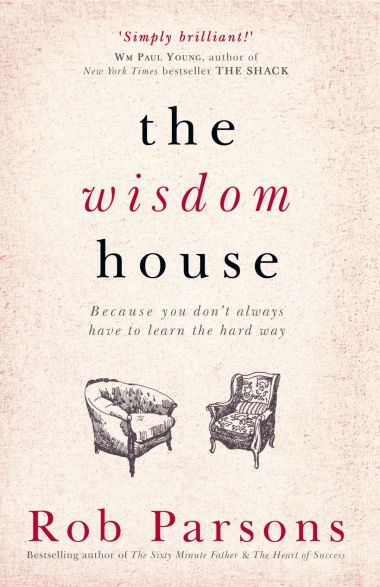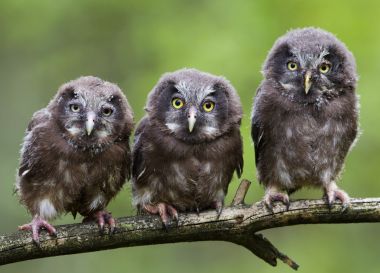Rob Parsons on wisdom, success, and not having to learn the hard way

Hopeful - or fearful - for 2015? Sarah Lothian gets a hefty dose of wisdom from best-selling author and speaker Rob Parsons.
Tell us about the idea behind your latest book The Wisdom House.
It started when my grandson was born just over a year ago. He arrived on the Saturday night and the next day I was shaving and I thought I'd love to write him a letter.
So I wrote to him, welcoming him to the world and just giving him a couple of tips. And then after I finished that I looked around my study. There are two big leather chairs and I imagined my grandkids coming in when they're grown and me just getting a chance to share with them. I'd share lessons I'd learnt for myself, but also from other people and a million things – love, dreams and hopes and fears, success and money and compound interest and faith and doubt.
And then I thought of the story my mum used to tell me of a land far away where the elderly people were respected. Before they died they were asked to write a life lesson on a scroll and it was kept in a hut in the middle of the village. Once a year the elders would gather people round and read them the life lessons and they called that place the Wisdom House. So I had this idea of me talking to my grandchildren perhaps when somebody had broken their heart or they were moving house or getting ready for their first job, or whatever, and just sharing lessons. And I had this idea of a line for the book that you don't always have to learn the hard way. People say you do but I don't think you always have to learn the hard way.
We're on the cusp of a New Year. What would you say to someone who wants life to change for them in 2015? Most of us will make New Year Resolutions...
I once heard a guy give a TED talk and he said if you want to learn Spanish or climb Kilimanjaro do you think you've got more chance of doing it if you tell your friends that you're going to do it or if you keep it to yourself?
The general response was to tell your friends because then they'll hold you accountable. But he said no, it's better if you tell nobody because sometimes if you tell other people 'I'm going to do this or that' it's almost as if the brain ticks it off as done. Sometimes it's not a bad thing occasionally to keep New Year resolutions to yourself and they kind of niggle away at you.
But I also think there comes a point where we actually have to do something. There's a lovely verse in Ecclesiastes: 'Those who watch the wind never sow and those who watch the rain never reap'.
In other words you've got this bunch of seed in your hand and you think if I sow this now the wind is sure to come and blow it away, I'll wait for tomorrow. But sometimes you just have to stick the thing in the ground and give it a shot
Another thing is that you have to be prepared to fail and you just have to take that as part of the package. You sometimes need to reach – and even if you fail, you achieve something. Sometimes we're so insecure we won't try anything new unless we're sure of success; that limits us enormously.
And others are paralysed by fear of what other people might think.
I came across a letter written by a woman in her 60s and she said she's spent 50 years, half a century, a prison of other people's opinions of her life. Always looking over her shoulder wondering what other people were thinking. If we do that we hard it hard to take risks, we find it hard to be ourselves. I've discovered that there are two kinds of critics in life.
The first kind of critic wants to build you up, the second wants to come along with a big iron ball and knock stuff down. And it very important we spot the difference.
How can we do that?

Well I think we have to understand that difficult people will always be with us. They leave our office and we think it's going to be great and [then] others rise up to take their place.
We spot people after a while who we believe in and we believe they're actually on our side. We notice that when we do well they praise us – somebody said the greatest test of friendship is our friend's success.
And we notice people that when we're successful, they resent it – they're not for us...they enjoy our failure.
I was struck by the image of you in the book when you went up to the boy in the playground, asked him to be your friend – and were laughed at. How can we bounce back when we've taken a risk and been let down?
It's really hard. Recently I took little Harry - he's four and a half - to his school disco. So I take him and we're a bit late getting there and he's wandering around looking for someone to dance with, and I think 'and so it begins'.
This is the story of all our lives and I think really that we deal with that one of two ways. We can protect ourselves and so are never hurt and so that means we never know relationship.
CS Lewis said: 'It's impossible to love anything – not even an animal – without your heart being broken' – so there's no point even trying to build even a friendship let alone a romantic relationship unless we're prepared for our heart to be broken.
Relationships are painful, but they are also valuable, and important and worth the risk.
The Wisdom House is published by Hodder and Stoughton and is out now.











